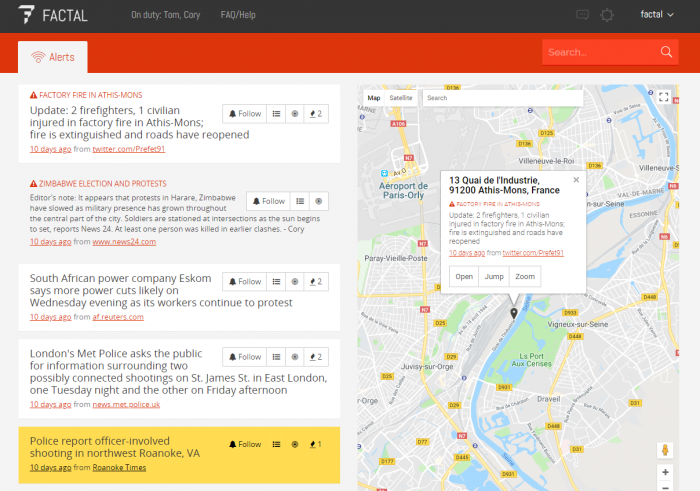
Breaking News has built up a large following among journalists, government workers, industries whose success depends on accurate and fast news, and news junkies of all types from around the globe. Unfortunately, despite its consumer appeal, Breaking News has not been able to generate enough revenue to sustain itself.
A little under two years later, the founders of Breaking News think they’ve found a way to bring back the product (sort of) while making money. Cory Bergman announced Tuesday that he and Ben Tesch are launching Factal, with former MSNBC Interactive president Charlie Tillinghast as CEO. The service will cost a few thousand dollars a month (via yearly subscription) and, for now, is aimed solely at businesses who need to make quick decisions (whether to close a store, for instance) in emergencies; while a consumer product is in the works, it’s a “next-year project,” Bergman told me.
When Breaking News shut down, its founders got emails from plenty of emails from individual users of the app, but also from global companies “who were using Breaking News to keep an eye on the world,” Bergman said. “When something happened that posed a risk to their people, or stores, or vehicles, or supply lines” — wildfires and extreme weather, terrorist events and school shootings — they would be able to act on [Breaking News’ alerts] very quickly, to get people out of the way and minimize risk.” For a time after the shutdown of Breaking News, Bergman and Tisch were in the mindset of trying to restore it as a free product — “but after we sat down and talked with these companies, we realized we should build a new company, tailor-made to solve the problems they have.”
Client companies get logins to an online alert dashboard, along with an interactive map to show where news is happening, and choose the locations and topics for which they want to receive alerts. There’s also an iOS app, with Android on the way. Alerts aren’t limited to emergency events. “The core thing we’re focused on is things that happen at a location that poses a potential risk to people nearby or disrupts transportation significantly,” Bergman said. “But we’re also interested in trade and regulation and summits between countries.” As with Breaking News, however, there’s no celebrity or sports news.
The team has worked hard to refine its signal detection tool, which scans social media and other public data sources across 26 languages (so far) to find incidents in their early stages. The editorial team verifies the events and publishes them with links back to original sources, plus context-adding editors’ notes. “We share what we know and we share what we don’t know. We have a code of ethics on correction, sourcing, and privacy that surrounds Factal and is similar to what you’d see in a newsroom,” Bergman said. “I think it’s what sets us apart from other social tools. We are a journalism and technology company.”Factal, which has offices in Seattle and London, has raised a little more than $1 million in seed funding. An app for individuals is on the roadmap, but we won’t see it until at least next year. “Our mission is to protect people from harm around the world, so a consumer product is near and dear to us,” Bergman said. “But we want to start with the B2B product to build a strong financial footing and get the engine going well.”